- Featured
- Clean air
- Climate justice
- Consumer Rights
- Corporate Accountability
- Data access
- Early Childhood Development
- Economic fairness
- Education
- Electoral fairness
- Environmental justice
- Food justice
- Gender based violence
- Grants/social assistance
- Health
- Housing and infrastructure
- Industry interference
- Land Justice
- LGBTQIA+ rights
- Media/ information access
- Public transport
- Racism
- Reparations
- Safety
- Sanitation
- Service Delivery
- Sexual and Reproductive Rights
- Social justice
- Unemployment
- Womxn's rights/ gender equality
- Workers' rights
- More
-
Demand Corona Relief Fund be set up for precarious workers during the LockdownPrecarious workers make use of mass transport systems (taxis and buses) to get to and from work, areas the WHO and National Department of Health have deemed as high risk for infection. Furthermore, domestic workers and health care workers work in intimate spaces with people who are at high risk of COVID-19 infection, such as the elderly and people who have travelled to and from high-risk countries. However, due to the legacy of inequality, we continue to live in, these are the very same workers who will not be paid – and cannot afford – to self-quarantine. Without income, they also cannot afford healthy food or medication, making them even more vulnerable. We commend the Government for communicating around COVID-19, however, gaps remain in addressing the anxiety, fear and stigma related to infection. On top of the fear of dying, vulnerable workers reside in communities where the potential is high for stigmatisation and discrimination in the event of self-quarantine or being identified as having the virus. We believe that a successful response to COVID-19 requires unity among all who live in South Africa, and we aim to be part of a unified solution. That unified response, however, requires Government to take bold and deliberate steps to ensure that the most vulnerable members of society are cared for and have their dignity and livelihoods secured. COVID-19 will exacerbate inequality among the working class of this country as they do not have the choice to ‘work from home’ and they are subject to ‘no work no pay’ labour conditions. This is compounded by the fact that domestic workers and informal workers particularly still do not have access to the Compensation for Occupational Injuries and Diseases Act (COIDA) that other COVID-19 affected formal workers have. This means that domestic workers and informal workers cannot claim compensation in the event that they contract COVID-19 while at work. Given that we are officially under a national state of disaster, Mr President, we call for expedited access to the Unemployment Insurance Fund (UIF) for domestic workers and informal workers.830 of 1,000 SignaturesCreated by Coalition of Unions, Formal and Informal Workers, Organisations, Activists and other Allies
-
Cheap rent for the rich? Object to the Rondebosch Golf Course leaseCape Town is the most spatially divided city in the country - it is still separated along race and class lines. The City has consistently blamed this spatial injustice on the lack of well-located land that could be used for affordable housing. But the City often misses the most obvious solution: It already owns massive pieces of land in well-located areas. Land that is unused or not being used to its full potential, that could provide ample space for affordable housing and reverse the City’s apartheid legacy. Last year, Ndifuna Ukwazi released a research report exposing how the City is disposing of the public land it owns by leasing it to private organisations at massively discounted rentals [3]. This land includes parking lots that are empty for up to 18 hours a day, bowling greens with very few members, and massive golf courses that provide enjoyment to only a few wealthy residents on the weekends. This is an inefficient, exclusive and unsustainable way to deal with well-located public land. Surely this land should be put to better use? If we are serious about addressing Cape Town’s apartheid legacy, we need to make our voices heard. Object to the lease renewal of 45,99 hectares of prime public land that should be used for affordable housing before 9 March 2020. The experts at Ndifuna Ukwazi have put together this progressive submission you can use when sending in your own objection. If enough of us send in our objections we can stop the City of Cape Town from renewing the Rondebosch Golf Club lease. [1] Cape Town’s course of injustice: Subsidising the rich to exclude the poor, Michael Clark for the Daily Maverick January 28 2020 [2] https://rondeboschgolfclub.com/membership [3] Ndifuna Ukwazi: Cape Town’s failure to redistribute land https://drive.google.com/file/d/1Pxly1G47qbC79l58Oss4vKvvK4AO71M-/view1,247 of 2,000 SignaturesCreated by Ndifuna Ukwazi

-
Add your name to assist Wits students owing more than R20 000 to registerLungelo Malevu, holding a BSc in Biological Sciences is one of many from Wits University who currently have historical debt “I owe R135 893.28 and the university has withheld my degree and I only have access to my unofficial transcript. This is a challenge because I cannot apply for a number of jobs since there is no proof that I have completed my degree” Portia Mosime, hoping to register for her final year in Psychology “my mother is unemployed but we survive through the money she makes from her vegetable garden which supplies her community with fresh veggies, however she makes less than R500 a month this is not enough to cover the outstanding debt at Wits amounting to R76 117.81” Students often financially excluded from institutions of higher learning are black female students from previously disadvantaged backgrounds. They account for close to 58% in universities and 57% in TVET colleges [4]. The lack of access to funding opportunities for higher learning affects them the most. Following the efforts made by the SRC and other important organizations, these testimonies should motivate people to add their names to this campaign to put more pressure on the financial committee (FinCo) as they are the ones responsible for determining the fees to be paid by students. Ultimately this should end the unequal access to institutions of higher learning affecting poor black South African youth. The efforts by NSFAS and other funding schemes can only assist a certain number of students, this further reduces the rate at which graduates enter the job market. Despite unemployment rates being high, the critical work of doctors and nurses requires a surplus of recent graduates based on the demands of the job. If a medical degree student fails to clear their historic debt they cannot graduate and enter the job market, potentially changing people’s lives. These dreams end up not being a reality. Therefore, the more support this campaign gains, the fight against academic exclusion due to finances is kept alive, students around this time are in distress and often end up further getting themselves into more debt and stress way before the academic year starts. Adding your name to this campaign at this moment ensures that the relevant decision makers can act now and implement these demands before the month comes to an end. This means that students with historic debt can continue with their studies. References [1] Wits Vuvuzela, 2019 Accessed here: https://www.wits.ac.za/registration/returning-undergraduate-students/ [2] Takalani Sioga for the Wits Vuvuzela. 3 August 2018. Accessed here: https://www.witsvuvuzela.com/2018/08/03/nsfas-tells-2019-applicants-to-wait/ [3] Michael Pedro for EWN, 2019. Accessed here: https://www.google.com/amp/s//ewn.co.za/2019/03/24/dhet-allocates-r697m-to-nsfas-to-settle-historic-debt-owed-to-universities/amp [4] South African Market. 12 November 2019 Category: Education accessed here: https://www.southafricanmi.com/education-statistics.html346 of 400 SignaturesCreated by Thabisile Miya
-
Demand SABC refunds the top 10 song of the year votersThe SABC started the selection process for "song of the year 2019" and opened voting lines to listeners even though they already knew that they did not have an agreement with the concept owners of "song of the year". The concept owners took the SABC to court to stop this. The Court then instructed the SABC to not air "song of the year 2019", resulting in a loss for all those who had already voted. It is false advertising and unfair to those who voted that the SABC has taken their money but did not deliver a song of the year countdown.34 of 100 SignaturesCreated by Nomvula Maneli
-
Demand a NHI that works for the peopleRight now right-wing groups like Afriforum and some people with medical aids, are mobilising in large numbers to try to stop the NHI. We can’t afford to let the rich try to stop the NHI which could improve the lives of the majority. We also can’t afford an NHI that fails our people. The NHI is not perfect, as seen in the pilot sites. This is why it is more important than ever to make our voices heard and with enough public submissions, shape the NHI to serve the health needs of the majority of people in South Africa. If enough of us come together, our public submissions could help ensure that the NHI is not captured by medical aids or greedy capital. While also demanding the NHI is accountable and provides quality health services free from corruption, patronage and mismanagement. The amandla.mobi team are not health experts. But what we have done is read expert submissions and identified key recommendations that reflect the values of the amandla.mobi community. That’s why we have created this progressive submission you can use when sending in your own submission. https://youtu.be/ccfj30DK0wc177,651 of 200,000 SignaturesCreated by amandla.mobi

-
Tell the new Minister of Health to make anti-smoking laws a priorityLast year thousands of amandla .mobi members came together and sent the Department of Health submissions in support of the Draft Tobacco Control Bill to ban public smoking, regulate e-cigarettes and other tobacco control regulations. The Department of Health is finished reading our submissions and the process has slowed down once again. But, with the appointment of a new Minister of Health, we have an opportunity now to put pressure on the department. We can make sure one of the first decisions the new Health Minister makes is prioritising the bill. Let’s get Minister Mkhize’s attention. If enough of us come together and send him welcome messages, it could get the new Minister to help make these overdue anti-smoking laws a reality. Sign the petition to send Minister Mkhize a message. It only takes a minute to send the pre-written message but if you could add a personal message, our welcome will be even more powerful. Each year South Africa spends more than R59 billion to address tobacco related illnesses like lung cancer, emphysema, asthma and bronchitis [1]. At the same time the country only collects between R11 billion and R13 billion from tobacco taxes [2]. This means the South African taxpayer is paying for the healthcare bill of tobacco-related harm while the tobacco industry collects the profits. Our queues at clinics and hospitals keep getting longer and government keeps cutting the healthcare budget while cigarette companies make billions. But, the new Minister of Health, Zweli Mkhize, has a history of doing important life-saving work on HIV in KZN. He could be an important ally in our fight against big cigarette companies. Sign the petition to send Minister Mkhize a welcome message and make sure he joins us in our fight to keep South Africans safe from second-hand smoke. If we flood his mailbox with welcome messages, he’ll have no choice but to support and prioritise the new anti-smoking laws. We’ve taken the Draft Tobacco Control Bill from sitting on a shelf collecting dust, to nearly being implemented by the Department of Health. The people power we’ve built has brought us this far but it’s important we keep up the pressure until the bill is signed. [1] The Tobacco Atlas - South Africa [2] BAT revenue rises but profit and market share fall, Robert Laing for Bizcommunity July 201756 of 100 SignaturesCreated by amandla mobi member

-
SABC, stop airing alcohol ads that associate alcohol consumption with success.We live in an era where the digital world influences the lives of many people, especially young black communities from poor backgrounds. We see something, we digest it, we want to duplicate it. Institutions such as the SABC should not have a negative impact, or allow negative airing. As the national broadcasting company, content that is of harmful nature or influence should not be aired, if not controlled. It is no secret that alcohol ads are flooding television. What is more saddening is that these ads glamourise alcohol consumption, and associate it with being successful. In the ads, you will see young people in an environment ‘where successful people belong’ consuming the alcohol, and promoting and encouraging those who are watching to go buy and drink it. According to a special issue on alcohol advertising by the Southern African Alcohol Policy Alliance (SAAPA), research has linked exposure to portrayals of alcohol use in the mass media with the development of positive drinking expectancies by children and adolescents. Young people with more positive affective responses to alcohol advertising hold more favourable drinking expectancies, perceive greater social approval for drinking, believe drinking is more common among peers and adults, and intend to drink more as adults. [3] Another research conducted by the Soul City Institute of Social Justice indicate that young people’s views on alcohol advertising, marketing and availability have a direct influence on their drinking patterns and sexual behaviour. Conducted in a rural village in Mpumalanga and an urban township, where young people were encouraged to capture their experiences through photographs and captions, including participating in focus-group discussions, young males believed that drinking a particular brand would lead to them being successful and young women said flavoured drinks were targeted at them. [4] While there are a number of regulations against alcohol adverting that have passed, such as airing alcohol ads between 2pm - 5 pm on weekday and before 12pm on weekends on TV; and 6am - 9am and 2pm - 5pm on weekdays and no advertising before 12pm on weekends on radio, the laws need revisiting. In 2010, the World Health Assembly of the World Health Organisation endorsed a Global Strategy to Reduce the Harmful Use of Alcohol that countries needed to adopt. Ten policy options were identified, one of them being to reduce the impact of marketing, especially on young people and adolescents. While not explicitly calling for a complete ban of alcohol advertising the Global Strategy calls for strong regulation of the various forms of advertising and marketing and for a “precautionary approach to protecting young people against these marketing techniques”[5] If alcohol ads are never going to be banned, we strongly believe that not only the SABC, but other broadcasting channels as well, need to adopt the above strategy; • Do not use settings that associate alcohol products with status and success. • Avoid using young people in the advertisements, or implement a law that only adults from the age of 40 and so, can be in alcohol ads. • Refrain from using influential words such as “Boss, The Man, Good Life, etc. Why we should act now We are what we consume! South Africa has a peculiar drinking profile, and is currently dealing with a large community from the age 15, who are struggling with alcohol abuse. Even though there are hundreds of organisations and campaigns raising awareness about the dangers of alcohol abuse, it does not make it right to have such ads, which are promoting the very same thing that our young black women, men and non gender conforming society are struggling with. We know that advertising causes younger people to drink sooner and in greater quantities. It also creates an environment that normalises drinking and it typically only portrays positive sides of drinking and not any negatives.[6] If we act now, we can have the power to control what we consume on TV, and by doing that, we will be saving ourselves, and the lives of young people. #WeDontNeedAlcoholToBeSuccessful [1] SABC Could Lose Half a Billion Rand If Alcohol Ads Are Banned. Zodidi Dano for IOL. 16 April 2018 [2] Banning Advertising Alcohol Can Save SA R1.9 Billion. Zeenat Vallie for IOL. 2 March 2018. [3] Impact of Alcohol Advertising and Media Exposure on Adolescent Alcohol Use. Peter Anderson, Avalon de Bruijn, Kathryn Angus, Ross Gordon & Gerard Hastings. SAAPA. 14 January 2009. [4] Alcohol Ads Luring SA Youth to Drink. Noni Mokati for IOL and Soul City Institute For Social Justice. 24 February 2017. [5] Alcohol Advertising In South Africa: A Trend And Comparative Analysis. Corne van Walbeek & Michael Daly for School of Economics, University of Cape Town. January 2014. [6]Proposed New Liquor Law Needs Revisiting. Marvin Charles for IOL. 16 August 2017. Image: Pexels144 of 200 SignaturesCreated by Tlou Seopa
-
Tell MEC Nkakareng Rakgoale to build a center for the Gogogetters in MusinaBuilding a center for the Gogogetters is part of the Department of Social Development’s mandate to deepen social assistance and enhancing the capabilities of communities to achieve sustainable livelihoods and household food security[2]. It is important because old people are seen as a liability, while in actual fact they can have a big impact on social and economic prosperity locally and globally. Gogogetters are lacking recognition because of the pervasive negative perception of ageing hence, they are finding it hard to build a center for themselves. The Musina Local Municipality has since given the Gogogetters land to build a center but because of financial difficulties, they are unable to utilize the land. Gogogetters are ready to venture into entrepreneurship because it is an important role in the country’s development. The center will boost the economy of Musina and attract more tourists as it is one of South Africa’s special economic zones. Looking at the 2019 Statistics South Africa’s Quarterly announcement of unemployment rate in the country, it has increased to 27,6% hence such an initiative is for a good cause as it will help deal with unemployment challenges [3]. The budget from Social Development is not enough and this campaign is calling upon the newly elected MEC for Social Development in Limpopo,Nkakareng Rakgoale to make sure the budget allocated for Gogogetters is increased to enable the building of the center that the Gogogetters have been longing for the past 3 years. Let’s come together and signing to join this campaign to ensure MEC Nkakareng Rakgoale builds a center to better the lives of Gogogetters. Namadzavho Mukona is a 69 year old Gogogetter whose life has been positively changed by this organization. She says because of Gogogetters, “I no longer get sick by always sleeping at home doing nothing. The activities we do at the Gogogetters are keeping me active and healthy”. References [1] South African Year Book, Social Development 2016/2017 [2] Investigative Hearing into Systematic Complaints Relating to the Treatment of Older Persons, South African Human Rights 09 June 2015 [3] SA’s Unemployment rate spikes, Sarah Smith of Mail &Guardian 14 May 2019128 of 200 SignaturesCreated by Sanra Mbedzi
-
Tell British American Tobacco to pay the tax they owe usThe big cigarette company British American Tobacco (BAT) have been fighting hard against new anti-smoking laws and taxes by shifting focus onto the illicit cigarette trade and tax evasion. They are funding a misleading campaign to convince government not to increase taxes on cigarettes so they can protect their profits [1]. Even companies like PricewaterhouseCoopers (PwC) are repeating industry claims that increasing taxes drives the illicit trade [2], even though industry has been caught over estimating and funding research into illicit trade [3]. Now Sars say BAT themselves are guilty of tax fraud and evasion and owe R143 million [4]. Clearly, they have been dishonest and shady in their tactics. But big companies like BAT rely on their brand and public image so they are vulnerable to us exposing their hypocrisy. If enough of us come together and shine a spotlight on their shady business and demand they pay what they owe- they will have no choice but to pay the R143 million. Join the campaign to demand BAT stop tax evading and pay what they owe. Each year South Africa spends more than R59 billion to address tobacco related illnesses like lung cancer, emphysema, asthma and bronchitis [5]. At the same time the country only collects between R11 billion and R13 billion from tobacco taxes [6]. This means the South African taxpayer is paying for the healthcare bill of tobacco-related harm while the tobacco industry collects the profits. Our queues at clinics and hospitals keep getting longer and government keeps cutting the healthcare budget while cigarette companies make billions. But, if enough of us come together and demand they pay what they owe, they will have no choice but to pay the R143 million. Government can use this money to help our struggling healthcare system. References [1] Did Big Tobacco buy Twitter? Joan van Dyk for Mail & Guardian 7 Sept 2018 [2] What to expect from the budget: Small tax increases, lower tax collection. Muhammad Hussain for City Press 13 Feb 2019 [3] Are the tobacco industry's claims about the size of the illicit cigarette market credible? The case of South Africa. 2014 Corné van Walbeek, Lerato Shai [4] Sars faces off with British American Tobacco over R143m tax bill, Graeme Hosken for Sunday Times April 2019 [5] The Tobacco Atlas - South Africa [6] BAT revenue rises but profit and market share fall, Robert Laing for Bizcommunity July 20171,889 of 2,000 SignaturesCreated by Khaliel Moses
-
Save Msunduzi CityThe Msunduzi Local Municipality is dysfunctional and is on the brink of collapse and as residents and ratepayers of Msunduzi, hereby unanimously voice our strong and serious concern at the continued lack of effective and efficient delivery of basic services. We demand that the Msunduzi address and improve the service delivery issues and implement the auditor-general report recommendations of (2017-2018) by the 15 April 2019 failing which we, the long suffering residents and ratepayers of Msunduzi, will have no alternative but, in terms of Section 139 of our National Constitution, to motivate for National and Provincial intervention in the local government and management of Msunduzi, including that the Council be dissolved and the municipality placed under administration.5,663 of 6,000 SignaturesCreated by Anthony Waldhausen
-
Tell Min. of Finance Tito Mboweni to increase Corporate Income TaxWith Mzansi’s economy struggling, rising fuel prices and the VAT increase- the poor of Mzansi are in crisis. But despite this, government is trying to cut more public spending on things like healthcare, housing and social grants which are meant to give important economic relief to the poor [1]. We, the people, already shouldered the tax burden when VAT was increased last year. It is big business’ turn to pay their fare share. Tell Finance Minister Tito Mboweni, he must increase Corporate Income Tax for the tax-dodging and greedy rich and start prioritizing economic relief for the people. We welcome the announcement that sanitary pads, white bread flour and cake flour will be VAT free. With VAT at 15%- the burden of fixing the economy is still on the shoulders of the poor. But the gap between the rich and poor in Mzansi is one of the largest in the world. Mzansi is a country where the top 10% control 90-95% of the wealth [2]. It is unjust that Treasury keeps proposing solutions to the ongoing economic crisis by increasing the tax burden on the majority, especially poor Black women especially whilst 89% of companies in SA don’t pay Corporate Income Tax [3] and R965 billion leaves the continent in illicit financial flows every year. [4] Mzansi is dominated by greedy multinational companies. We the people essentially subsidize corporates. Government cutting public expenditure on things like healthcare, housing and social grants which give financial relief to an already struggling poor is not the solution to our struggling economy. Tell government and Treasury to tax the mega-rich instead by increasing the Corporate Income Tax. [1] The 2018 mid-term budget speech in a nutshell, Staff Writer for Business Tech October 2018 [2] 10 Percent Of South Africans Own 90 Percent Of The Country's Wealth, Staff Reporter for The Huffington Post July 2018 [3] Corporates not ‘tax compliant’. Baldwin Ndaba and African News Agency for The Mercury 22 Aug 2018326 of 400 SignaturesCreated by Khaliel Moses
-
Tell Heineken to stop abusing labour broker workers in South Africa(For those who are Dutch speakers there is a translation of the below text into Dutch at the end of the English text) A total of 55 workers were recently dismissed from the Heineken brewery in Sedibeng, South Africa. The workers were employed through labour brokers to do jobs such as sorting and packing. Some have been earning less than R4500 per month and they all earn only 20-25% of what their co-workers who are directly employed by Heineken earn. These workers have been working under, what they call ‘slavery conditions’. Gladys Thaane who worked at Heineken brewery in Sedibeng for 9 years before being dismissed says, “They keep us in a state of being unsure and anxious all the time by moving us from labour broker to labour broker. I worked under five different labour brokers while doing the same job of packing and sorting for Heineken. This is their way of keeping us away from decent wages and rights. For us women it is so bad. We suffer from long periods (menstruation), back pains and breast problems but we cannot say anything because we are not sure we’ll have a job the next day. The managers even target us for sexual harassment. Now when we claim our rights they chase us away.“ The workers were accused of participating in an ‘illegal gathering’ and ‘breaking labour laws’ by the labour brokers who employed them. This despite the fact that there is no concept of an ‘illegal gathering’ in South Africa’s laws. The workers took part in a legal protest in their time off against someone other than their official employer which means there was no way they broke labour laws. The workers were part of a group that visited Heineken’s head office in South Africa and tried to meet with the company. These workers were victimized for simply fighting for their basic rights. This hardheaded response of Heineken is consistent with how it reacted to all efforts of the labour broker workers to improve their conditions and claim their rights over the last few years. The company only acknowledged the workers and their struggles when there was public pressure on Heineken to treat its workers fairly. We demand that Heineken immediately rehire these workers with permanent employment and living wages. Bij de Zuid Afrikaanse Heineken brouwerij in Sedibeng zijn onlangs in totaal 55 werknemers onslagen. Zij waren in dienst als uitzendkrachten en verrichtten taken als flessen sorteren en kratten vullen. Sommigen verdienden minder dan 300 euro per maand. Uitzendkrachten verdienen slechts 20% tot 25% van wat werknemers verdienen die direct bij Heineken in dienstverband zijn. "Mijn naam is Gladys Thaane. Ik werk al 9 jaar bij Heineken Sedibeng en het is al 9 jaar een worsteling. We zijn constant bezorgd en onzeker op het werk omdat we van uitzendbureau naar uitzendbureau worden geschoven. Ik heb voor 5 verschillende uitzendbureaus gewerkt terwijl ik dezelfde baan had: flessen sorteren en kratten vullen voor Heineken. Dit is hun manier om ons weg te houden van degelijke betaling en onze rechten. Voor ons vrouwen is de situatie heel slecht. We lijden aan erge menstruatieklachten, rugpijn en borst problemen, maar we kunnen niets zeggen omdat we niet zeker weten of we de volgende dag nog een baan hebben. Vrouwen zijn zelfs het doelwit van sexuele intimidatie door managers. Wanneer we voor onze rechten opkomen, worden we weggejaagd. Maar we gaan niet weg. Help ons alstublieft om gerechtigheid te krijgen door deze petitie te tekenen." De ontslagen werknemers worden door de uitzendbureaus beschuldigd van ‘illegale samenkomst’ en het ‘overtreden van arbeidswetten’. In de Zuid Afrikaanse wet bestaat echter geen concept als ‘illegale samenkomst’. Daarnaast namen de werknemers feitelijk deel aan een legale bijeenkomst, in hun eigen tijd, bij een bedrijf dat officieel niet hun werkgever is. Dit betekend dat de uitzendkrachten niet in een positie waren om arbeidswetten te overtreden. De ontslagen werknemers zijn onderdeel van een groep die het hoofdkantoor van Heineken in Zuid Afrika bezochten in een poging een ontmoeting met het bedrijf te bewerkstelligen. De deur van het Heineken kantoor bleef echter dicht. Deze koppige reactie van Heineken is consistent met eerdere reacties van de multinational in de afgelopen jaren op de pogingen van de uitzendkrachten om hun situatie te verbeteren en hun rechten op te eisen. Slechts wanneer er publieke druk is uitgeoefend heeft het bedrijf gereageerd op de werknemers. Uw handtekening is van groot belang om Heineken te dwingen de, volgens de uitzendkrachten, “slavernij omstandigheden” aan te pakken. Eis dat de onterecht ontslagen uitzendkrachten direct hun baan terugkrijgen, permament bij Heineken in dienst komen en fatsoenlijke lonen betaald krijgen!234 of 300 SignaturesCreated by Khaliel Moses
.png)
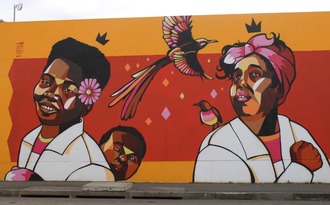


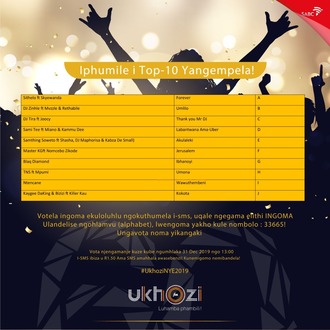
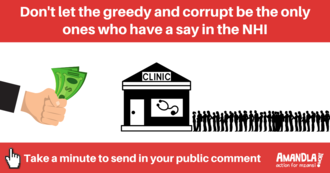
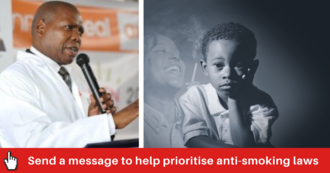
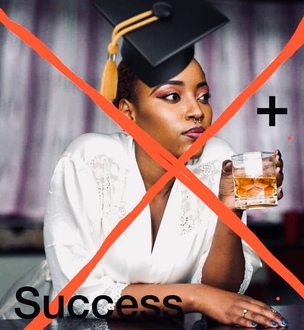

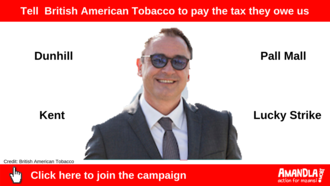.png)

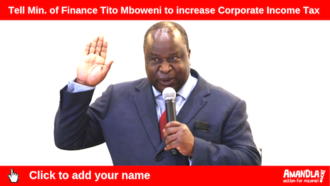.png)
